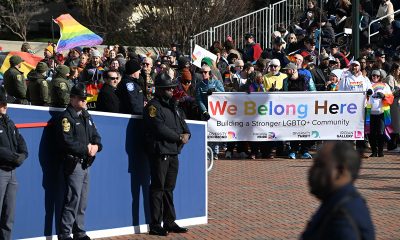Books
SPRING ARTS 2018 BOOKS: Fact, fiction and beyond
Queer themes — especially trans memoirs — abound in spring book crop
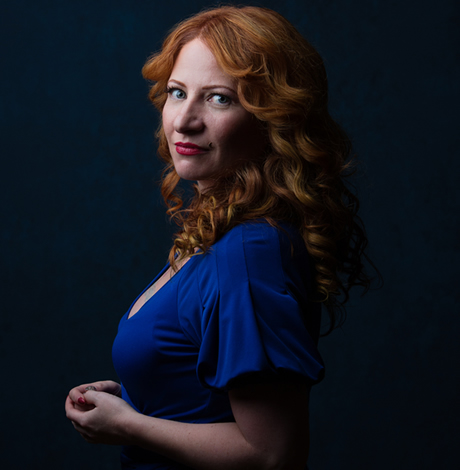
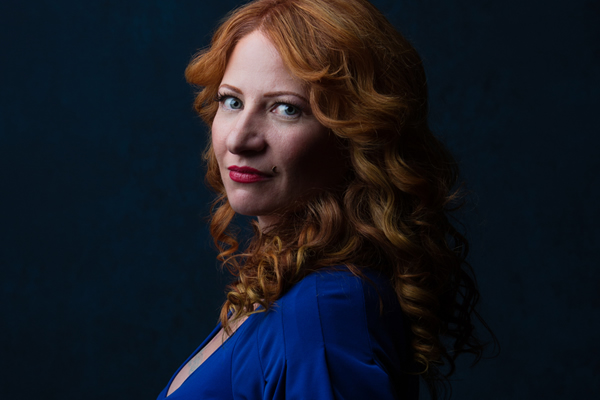
Out author Amber Dawn returns with her second novel ‘Sodom Road Exit’ on April. 3. (Photo courtesy Dawn)
In her much-anticipated memoir, “Tomorrow Will Be Different: Love, Loss and the Fight for Trans Equality” (Crown Archetype, March 6), Sarah McBride tells the story of how she went from closeted student body president at American University to the first transgender person to speak at a national political convention at the age of 26. One of the most prominent transgender activists of her time, McBride interweaves thoughtful analysis of contemporary political issues, such as bathroom access and trans health care, into her own triumphant journey. The book begins with a foreword by Joe Biden.
“Speak No Evil: A Novel” by Uzodinma Iweala (Harper, March 6) just might be the coming-out story of the year, and a Washingtonian one at that. Iweala’s heart-wrenching sophomore novel follows Niru, a seemingly charmed track star at an elite D.C. private school bound for Harvard. Only his best friend Meredith knows he is gay until his sexuality is discovered by his conservative Nigerian father. The repercussions are swift and violent, catastrophic for his relationship with his family and taxing in his friendship with Meredith. The novel is a visceral but compassionate portrait of what it means to be different within a family, let alone society at large.
In “The Affliction” (Four Way Books, March 6), award-winning poet C. Dale Young makes his fiction debut with a novel told in fantastical short stories, spanning the United States and Caribbean. Among the novel’s many memorable characters are a man who can disappear, a woman who can see the future and a man raised in a cult who believes he is doomed to die. Young is openly gay and of Latino and Asian descent. He is also very much left- and right-brained in that he is a full-time physician when not writing and teaching creative writing at Warren Wilson College.
“The Sparsholt Affair” by Alan Hollinghurst (Knopf, March 13) begins with a covert gay relationship at Oxford University in 1940 and spans three generations, masterfully unfolding the social and sexual revolutions that have taken place through present day. Instantly a bestseller in the U.K., the novel is anchored by David Sparsholt and Evert Dax, whose evening trysts at Oxford feel especially under the radar with the world at war. Hollinghurst, who won the Man Booker Prize in 2004, is an openly gay English author.
“Berlin 1936: Sixteen Days in August” by Oliver Hilmes (Brodley Head, March 27) is a fascinating historical account of the 1936 Olympic Games in Berlin. Hilmes, a gay German historian, paints an intoxicating picture of the city of Liza Minelli’s “Cabaret” — where queer life flourished under the Weimar Republic — contrasted with the terrifying rise of Adolf Hitler. In addition to analyzing the events of the Olympic Games, namely Jesse Owens’ triumph, Hilmes also introduces us to the lives of ordinary (some queer) Berliners. The book is ultimately an ode to the city, which has since reestablished itself as one of the most dynamic creative queer capitals in the world.
Chelsey Johnson’s debut novel, “Stray City” (Custom House, March 20) is the queer anti-“Gilmore Girls” you didn’t know you needed. This warm, hysterical story follows 23-year-old Andrea Morales, who escaped her Midwestern Catholic childhood to create a life for herself in Portland’s vibrant lesbian community. One especially debauched evening, Andrea hooks up with a man and later finds herself pregnant. The novel jumps to a decade later, as Andrea’s precocious daughter Lucia starts asking questions about the father she’s never met.
“Written on the Body,” edited by Lexie Bean (Jessica Kingsley Publishers, March 21), is a collection of essays written by and for trans and non-binary survivors of sexual assault and domestic violence. With contributions from Dean Spade, Nyala Moon, Alex Valdes, Sawyer DeVuyst and Ieshai Bailey, this book offers support, guidance and affirmation for trans survivors, whose stories are too often met with incredulousness and skepticism.
Amber Dawn, a Lambda Literary Award winner, returns with her second novel, “Sodom Road Exit” (Arsenal Pulp Press, April 3). This spellbinding paranormal thriller takes place in the summer of 1990 in Crystal Beach. Queer picaresque heroine, Starla Mia Martin, drops out of college and returns to find her lakeside village a ghost town after its beloved amusement park shuts down. Starla soon discovers an unnerving energy in the air — strange sounds, phantasmagoric sightings — and instead of hopping off the rollercoaster, she confronts every twist and turn head-on.
If you’re a poetry fan, “Nepantla: An Anthology Dedicated to Queer Poets of Color” (Nightboat Books, May 1), edited by Christopher Soto, is a stunning celebration of the diversity of the queer poetry community, as varied in style and form as it is in the experiences held by each contributor. Soto launched Nepantla with the Lambda Literary Foundation as an online journal to share the work of queer and trans poets of color. This is its first time in print, featuring canonical pieces by legends like Audre Lorde and James Baldwin alongside their contemporaries, such as Natalie Diaz, Tommy Pico and Chen Chen.
Celebrated novelist Alexander Chee makes his nonfiction debut with “How to Write an Autobiographical Novel” (Mariner Books, April 17). This revealing collection of essays is Chee’s manifesto on what it means to be a contemporary writer and gay man, Korean American, artist, activist, lover and friend. While tracing the most decisive moments of his own life, Chee also examines some of the nation’s biggest historical turning points, from the AIDS crisis to the election of Donald Trump.
“Little Fish” (Arsenal Pulp Press, May 1) is the debut novel from Lambda Literary Award-winning short story writer Casey Plett. The protagonist, Wendy Reimer, is a 30-year-old trans woman who discovers that her late grandfather, a pious Mennonite farmer, was likely transgender as well. In distracting herself from the problems in her own life and those of her friends — from alcoholism, to sex work to suicide — Wendy finds herself fully consumed by this familial mystery and the need to uncover the truth.
“SELF-ish: a Transgender Awakening” (Red Hen Press, May 4), a memoir by Chloe Schwenke, tells of her life and adventures living in five countries and working on projects in more than 40, mostly in Africa and the Middle East. This former Obama Administration appointee, has committed her life to assisting marginalized groups in some of the world’s most challenging countries.
If you haven’t gotten a chance to see it live, snag the paperback of legendary playwright Tony Kushner’s “The Intelligent Homosexual’s Guide to Capitalism and Socialism with a Key to the Scriptures” (Theatre Communications Group, May 8). The play opens with Gus Marcantonio, a retired longshoreman, who has gathered his family together to discuss his decision to commit suicide. Kushner, who wrote “Angels in America” and has won a Pulitzer and two Tony Awards, uses his signature wit in telling a story of revolution, family and challenging the systemic constructs we consider inherent to our society. It will be interesting to see how it translates to the page; Theater J’s D.C. production a few years ago felt like three hours of overlapping screaming.
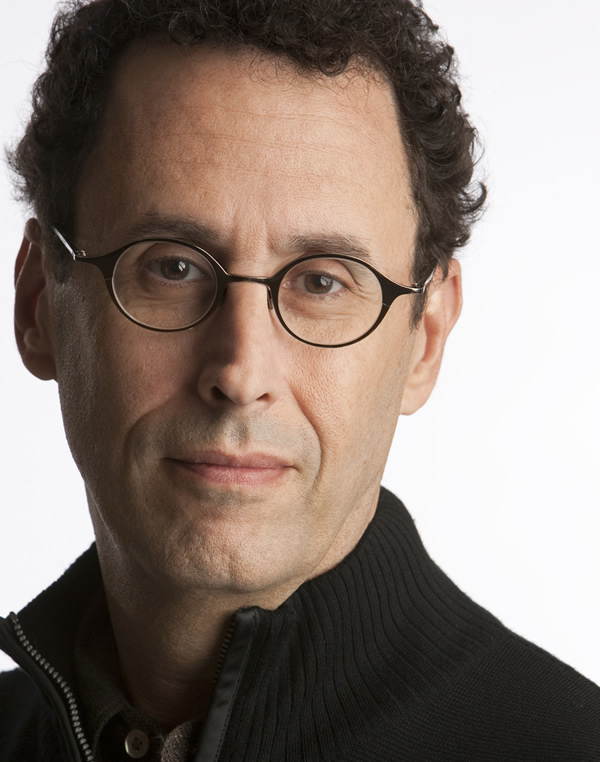
Out playwright Tony Kushner has adapted his play ’The Intelligent Homosexual’s Guide …’ to the written page. (Photo courtesy Berkeley Rep)
Other releases of note include:
• “The Routledge History of Queer America” (Routledge Histories), edited by Don Romesburg, offers one of the most comprehensive overviews of LGBT U.S. history, featuring nearly 30 chapters spanning the colonial era to present day. The book is $210 and releases March 14.
• “Post-Borderlandia: Chicana Literature and Gender Variant Critique”(Rutgers University Press) by Jackie T. Cuevas synthesizes Chicana/o studies with queer theory and transgender studies, exploring gender identity and expression using the Chicana feminist canon and contemporary thinkers and artists. The book is $26.96 and releases March 28.
• “Transforming: the Bible & the Lives of Transgender Christians” (Westminster John Knox Press) by Austen Hartke challenges the way readers conceptualize faith and the transgender experience, analyzing Biblical figures and providing representation to modern-day trans Christians. The book is $16 and out April 7.
• “Picture Us in the Light” by Kelly Loy Gilbert (Disney-Hyperion) is a poignant gay YA novel about Danny Cheng, a young artist bound for college who finds himself inexplicably panicked that he’ll be moving far from his best friend, Harry Wong. He’s also shaken by a disturbing discovery in his father’s closet. The book is $17.99 and releases April 10.
• “Not Here” (Coffee House Press) is the latest from critically acclaimed queer Vietnamese-American poet Hieu Minh Nguyen. Nguyen uses a wide variety of styles to provocatively confront whiteness, evoke both pleasure and pain, and find a sense of home in deep loneliness. The book is $16.95 and out April 10.
• “The Bride Was a Boy” by Chii (Seven Seas, May 1) is a delightful autobiographical manga novel about a transgender love story, drawn in the style of diary comics. Chii, who was assigned male at birth, begins with her childhood and continues through her latest adventure: marrying the man of her dreams. The book is $12.59 and available May 1.
• “Now the Night Begins” (Semiotext(e)/Native Agents) is gay French filmmaker Alain Guiraudie’s first foray into literature, translated by Jeffrey Zuckerman. Adopting his signature film themes, the novel is driven by disconcerting, overpowering sexual desire, centered on 40-year old protagonist Gilles Heurtebise’s all-encompassing obsession with a 90-year old man in his neighborhood. It costs $24.95 and is out May 11.
• “50 Queer Music Icons Who Changed the World” (Hardie Grant, May 15), written by Will Larnach-Jones and illustrated by Michele Rosenthal, is a beautiful tribute to the LGBT musicians who have been pushing boundaries since the 1920s, featuring everyone from Little Richard to Frank Ocean. It’s $14.99 and available May 15.
Books
‘The Vampire Chronicles’ inspire LGBTQ people around the world
AMC’s ‘Interview with the Vampire’ has brought feelings back to live

Four kids pedaled furiously, their bicycles wobbling over cracked pavement and uneven curbs. Laughter and shouted arguments about which mystical creature could beat which echoed down the quiet street. They carried backpacks stuffed with well-worn paperbacks — comic books and fantasy novels — each child lost in a private world of monsters, magic, and secret codes. The air hummed with the kind of adventure that exists only at the edge of imagination, shaped by an imaginary world created in another part of the planet.
This is not a description of “Stranger Things,” nor of an American suburb in the 1980s. This is a small Russian village in the early 2000s — a place without paved roads, where most houses had no running water or central heating — where I spent every summer of my childhood. Those kids were my friends, and the world we were obsessed with was “The Vampire Chronicles” by Anne Rice.
We didn’t yet know that one of us would soon come out as openly bi, or that another — me — would become an LGBTQ activist. We were reading our first queer story in Anne Rice’s books. My first queer story. It felt wrong. And it felt extremely right. I haven’t accepted that I’m queer yet, but the easiness queerness was discussed in books helped.
Now, with AMC’s “Interview with the Vampire,” starring Jacob Anderson as Louis de Pointe du Lac — a visibly human, openly queer, aching vampire — and Sam Reid as Lestat de Lioncourt, something old has stirred back to life. Louis remains haunted by what he is and what he has done. Lestat, meanwhile, is neither hero nor villain. He desires without apology, and survives without shame.
I remember my bi friend — who was struggling with a difficult family — identifying with Lestat. Long before she came out, I already saw her queerness reflected there. “The Vampire Chronicles” allowed both of us to come out, at least to each other, with surprising ease despite the queerphobic environment.
While watching — and rewatching — the series over this winter holiday, I kept thinking about what this story has meant, and still means, for queer youth and queer people worldwide. Once again, this is not just about “the West.” I read comments from queer Ukrainian teenagers living under bombardment, finding joy in the show. I saw Russian fans furious at the absurdly censored translation by Amediateca, which rendered “boyfriend” as “friend” or even “pal,” turning the central relationship between two queer vampires into near-comic nonsense. Mentions of Putin were also erased from the modern adaptation — part of a broader Russian effort to eliminate queer visibility and political critique altogether.
And yet, fans persist to know the real story. Even those outside the LGBTQ community search for uncensored translations or watch with subtitles. A new generation of Eastern European queers is finding itself through this series.
It made me reflect on the role of mass culture — especially American mass culture — globally. I use Ukraine and Russia as examples because I’m from Ukraine, spent much of my childhood and adolescence in Russia, and speak both languages. But the impact is clearly broader. The evolution of mass culture changes the world, and in the context of queer history, “Interview with the Vampire” is one of the brightest examples — precisely because of its international reach and because it was never marketed as “gay literature,” but as gothic horror for a general audience.
With AMC now producing a third season, “The Vampire Lestat,” I’ve seen renewed speculation about Lestat’s queerness and debates about how explicitly the show portrays same-sex relationships. In the books, vampires cannot have sex in a “traditional” way, but that never stopped Anne Rice from depicting deeply homoromantic relationships, charged with unmistakable homoerotic tension. This is, after all, a story about two men who “adopt” a child and form a de facto queer family. And this is just the first book — in later novels we see a lot of openly queer couples and relationships.
The first novel, “Interview with the Vampire” was published in 1976, so the absence of explicit gay sex scenes is unsurprising. Later, Anne Rice — who identified as queer — described herself as lacking a sense of gender, seeing herself as a gay man and viewing the world in a “bisexual way.” She openly confirmed that all her vampires are bisexual: a benefit of the Dark Gift, where gender becomes irrelevant.
This is why her work resonates so powerfully with queer readers worldwide, and why so many recognize themselves in her vampires. For many young people I know from Eastern Europe, “Interview with the Vampire” was the first book in which they ever encountered a same-sex relationship.
But the true power of this universe lies in the fact that it was not created only for queer audiences. I know conservative Muslims with deeply traditional views who loved “The Vampire Chronicles” as teenagers. I know straight Western couples who did too. Even people who initially found same-sex relationships unsettling often became more tolerant after reading the books, watching the movie or the show. It is harder to hate someone who reminds you of a beloved character.
That is the strength of the story: it was never framed as explicitly queer or purely romantic, gothic and geeky audiences love it. “The Vampire Chronicles” are not a cure for queerphobia, but they are a powerful tool for making queerness more accessible. Popular culture offers a window into queer lives — and the broader that window, the more powerful it becomes.
Other examples include Will from “Stranger Things,” Ellie and Dina from “The Last of Us” (both the game and the series), or even the less mainstream but influential sci-fi show “Severance.” These stories allow audiences around the world to see queer people beyond stereotypes. That is the power of representation — not just for queer people themselves, but for society as a whole. It makes queer people look like real people, even when they are controversial blood-drinkers with fangs, or two girls surviving a fungal apocalypse.
Mass culture is a universal language, spoken worldwide. And that is precisely why censorship so often tries — and fails — to silence it.
Books
Feminist fiction fans will love ‘Bog Queen’
A wonderful tale of druids, warriors, scheming kings, and a scientist
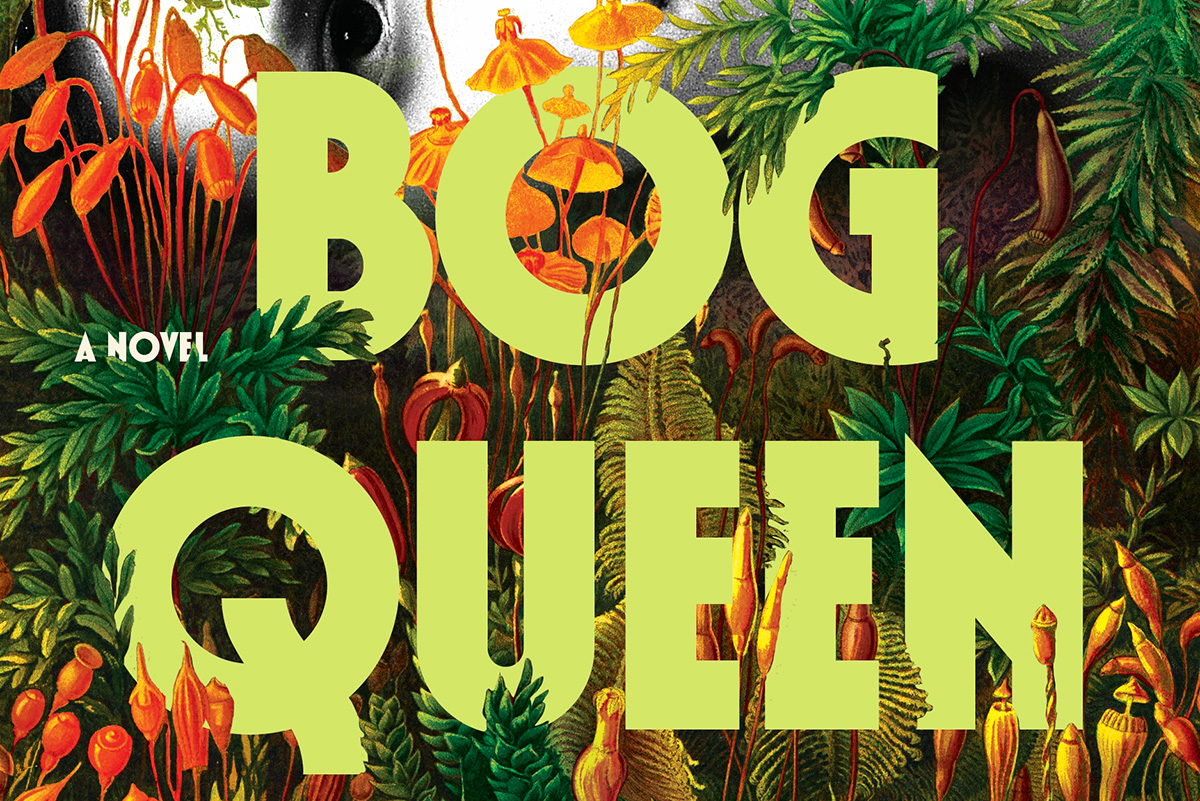
‘Bog Queen’
By Anna North
c.2025, Bloomsbury
$28.99/288 pages
Consider: lost and found.
The first one is miserable – whatever you need or want is gone, maybe for good. The second one can be joyful, a celebration of great relief and a reminder to look in the same spot next time you need that which you first lost. Loss hurts. But as in the new novel, “Bog Queen” by Anna North, discovery isn’t always without pain.

He’d always stuck to the story.
In 1961, or so he claimed, Isabel Navarro argued with her husband, as they had many times. At one point, she stalked out. Done. Gone, but there was always doubt – and now it seemed he’d been lying for decades: when peat cutters discovered the body of a young woman near his home in northwest England, Navarro finally admitted that he’d killed Isabel and dumped her corpse into a bog.
Officials prepared to charge him.
But again, that doubt. The body, as forensic anthropologist Agnes Lundstrom discovered rather quickly, was not that of Isabel. This bog woman had nearly healed wounds and her head showed old skull fractures. Her skin glowed yellow from decaying moss that her body had steeped in. No, the corpse in the bog was not from a half-century ago.
She was roughly 2,000 years old.
But who was the woman from the bog? Knowing more about her would’ve been a nice distraction for Agnes; she’d left America to move to England, left her father and a man she might have loved once, with the hope that her life could be different. She disliked solitude but she felt awkward around people, including the environmental activists, politicians, and others surrounding the discovery of the Iron Age corpse.
Was the woman beloved? Agnes could tell that she’d obviously been well cared-for, and relatively healthy despite the injuries she’d sustained. If there were any artifacts left in the bog, Agnes would have the answers she wanted. If only Isabel’s family, the activists, and authorities could come together and grant her more time.
Fortunately, that’s what you get inside “Bog Queen”: time, spanning from the Iron Age and the story of a young, inexperienced druid who’s hoping to forge ties with a southern kingdom; to 2018, the year in which the modern portion of this book is set.
Yes, you get both.
Yes, you’ll devour them.
Taking parts of a true story, author Anna North spins a wonderful tale of druids, vengeful warriors, scheming kings, and a scientist who’s as much of a genius as she is a nerd. The tale of the two women swings back and forth between chapters and eras, mixed with female strength and twenty-first century concerns. Even better, these perfectly mixed parts are occasionally joined by a third entity that adds a delicious note of darkness, as if whatever happens can be erased in a moment.
Nah, don’t even think about resisting.
If you’re a fan of feminist fiction, science, or novels featuring kings, druids, and Celtic history, don’t wait. “Bog Queen” is your book. Look. You’ll be glad you found it.
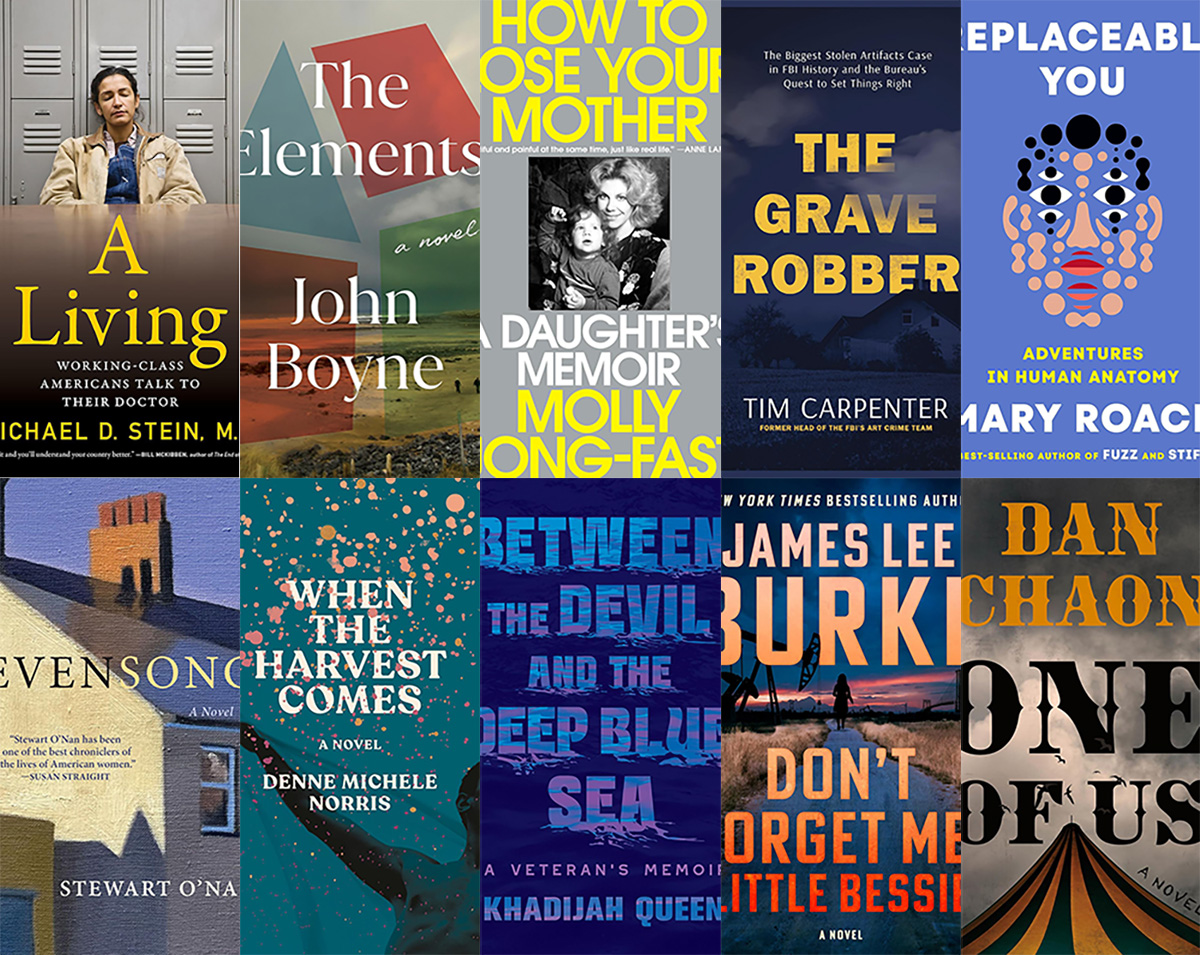
This past year, you’ve often had to make do.
Saving money here, resources there, being inventive and innovative. It’s a talent you’ve honed, but isn’t it time to have the best? Yep, so grab these Ten Best of 2025 books for your new year pleasures.
Nonfiction
Health care is on everyone’s mind now, and “A Living: Working-Class Americans Talk to Their Doctor” by Michael D. Stein, M.D. (Melville House, $26.99) lets you peek into health care from the point of view of a doctor who treats “front-line workers” and those who experience poverty and homelessness. It’s shocking, an eye-opening book, a skinny, quick-to-read one that needs to be read now.
If you’ve been doing eldercare or caring for any loved one, then “How to Lose Your Mother: A Daughter’s Memoir” by Molly Jong-Fast (Viking, $28) needs to be in your plans for the coming year. It’s a memoir, but also a biography of Jong-Fast’s mother, Erica Jong, and the story of love, illness, and living through the chaos of serious disease with humor and grace. You’ll like this book especially if you were a fan of the author’s late mother.
Another memoir you can’t miss this year is “Between the Devil and the Deep Blue Sea: A Veteran’s Memoir” by Khadijah Queen (Legacy Lit, $30.00). It’s the story of one woman’s determination to get out of poverty and get an education, and to keep her head above water while she goes below water by joining the U.S. Navy. This is a story that will keep you glued to your seat, all the way through.
Self-improvement is something you might think about tackling in the new year, and “Replaceable You: Adventures in Human Anatomy” by Mary Roach (W.W. Norton & Company, $28.99) is a lighthearted – yet real and informative – look at the things inside and outside your body that can be replaced or changed. New nose job? Transplant, new dental work? Learn how you can become the Bionic Person in real life, and laugh while you’re doing it.
The science lover inside you will want to read “The Grave Robber: The Biggest Stolen Artifacts Case in FBI History and the Bureau’s Quest to Set Things Right” by Tim Carpenter (Harper Horizon, $29.99). A history lover will also want it, as will anyone with a craving for true crime, memoir, FBI procedural books, and travel books. It’s the story of a man who spent his life stealing objects from graves around the world, and an FBI agent’s obsession with securing the objects and returning them. It’s a fascinating read, with just a little bit of gruesome thrown in for fun.
Fiction
Speaking of a little bit of scariness, “Don’t Forget Me, Little Bessie” by James Lee Burke (Atlantic Monthly Press, $28) is the story of a girl named Bessie and her involvement with a cloven-hooved being who dogs her all her life. Set in still-wild south Texas, it’s a little bit western, part paranormal, and completely full of enjoyment.
“Evensong” by Stewart O’Nan (Atlantic Monthly Press, $28) is a layered novel of women’s friendships as they age together and support one another. The characters are warm and funny, there are a few times when your heart will sit in your throat, and you won’t be sorry you read it. It’s just plain irresistible.
If you need a dark tale for what’s left of a dark winter season, then “One of Us” by Dan Chaon (Henry Holt, $28), it it. It’s the story of twins who become orphaned when their Mama dies, ending up with a man who owns a traveling freak show, and who promises to care for them. But they can’t ever forget that a nefarious con man is looking for them; those kids can talk to one another without saying a word, and he’s going to make lots of money off them. This is a sharp, clever novel that fans of the “circus” genre shouldn’t miss.
“When the Harvest Comes” by Denne Michele Norris (Random House, $28) is a wonderful romance, a boy-meets-boy with a little spice and a lot of strife. Davis loves Everett but as their wedding day draws near, doubts begin to creep in. There’s homophobia on both sides of their families, and no small amount of racism. Beware that there’s some light explicitness in this book, but if you love a good love story, you’ll love this.
Another layered tale you’ll enjoy is “The Elements” by John Boyne (Henry Holt, $29.99), a twisty bunch of short stories that connect in a series of arcs that begin on an island near Dublin. It’s about love, death, revenge, and horror, a little like The Twilight Zone, but without the paranormal. You won’t want to put down, so be warned.
If you need more ideas, head to your local library or bookstore and ask the staff there for their favorite reads of 2025. They’ll fill your book bag and your new year with goodness.
Season’s readings!
The Blade may receive commissions from qualifying purchases made via this post.
-

 Virginia5 days ago
Virginia5 days agoVa. Senate approves referendum to repeal marriage amendment
-

 Real Estate4 days ago
Real Estate4 days agoTop buyer-friendly markets for the LGBTQ community
-

 Theater5 days ago
Theater5 days agoVoiceless ‘Antony & Cleopatra’ a spectacle of operatic proportions
-

 Virginia5 days ago
Virginia5 days agoVIDEO: LGBTQ groups march in Va. inaugural parade




















